- Home
- Alison McGhee
Was It Beautiful? Page 2
Was It Beautiful? Read online
Page 2
She studied him, then jammed her hands back into the deep pockets.
“Yeah. He was.”
“What the hell, Sophie J.!”
“S. Sophie S.”
Again came the hot pricking at the back of his eyes.
“Throwing away his name like that,” he said. “You have a damn poor memory, don’t you? It must be all that marijuana you used to smoke. The Miller boys did you no favors, selling you that stuff.”
“A damn poor memory is one thing I haven’t got,” she said. “But I wish I did.”
Again he watched the tide of tiredness sweep over her. She closed her eyes and shook her head. When she opened them again to stare at him directly, he saw the brightness of unshed tears.
“I see a lot more than you give me credit for, William T.”
He raised his eyebrows and held them up high. She mimicked him with her own, arcs thin as the birds in the sketch a child pencils on rough brown paper. They stared at each other. She gave up first and jammed her hands back into the pockets of the parka. The parka. William T. had to turn away from the sight of her standing there. Jesus Christ.
Sophie took a step toward him, her sneaker cracking the thin ice of the mud puddle Genghis’s old pink hairbrush balanced on. The brush tipped into the puddle, its bristles disappearing. Dirty water seeped silently into the canvas of Sophie’s sneakers.
“Damn,” she said, looking down.
“How many pairs of those sneakers you got, anyway?”
“One.”
“One pair? They’re all I ever see you wear. How can you have just one pair?”
A closet lined with rows of scuffed used-to-be-white sneakers withered in his mind, turned into two worn-down Keds placed side by side on a muddy mat.
“I wear out one pair, I buy another.”
Anger swept through him, focused itself hot and ready on Sophie, standing there wearing William J.’s blue parka and her dirty white sneakers.
“Wear one out and buy another! They’re that easy to replace, are they?”
She stood her ground, gazing at him, her hands stuck in her pockets as if another pair of hands were inside that parka, holding on to her for dear life.
“Wear out one name, throw it away,” he said, his words stabbing into the cold air. “Wear out one husband, throw him away. I’ve seen you sneaking around down at that cabin on Sterns Valley Road at dawn, Sophie J. Don’t think you’re fooling anyone.”
Her face twisted and she shook her head.
Shake, shake, shake.
The sight of her, her back-and-forth head. Outside the air hung in the sky, tired and leaden, not fit for anything but sustaining life. William T.’s truck shuddered and groaned in its typical idling way and he closed his eyes. Opened them to the creak and groan of the passenger door.
Sophie was in the passenger seat, her head in her hands.
“William J. is gone,” she whispered. “I can’t believe it, that he’s just not here anymore. That he’s nowhere in this world.”
“I thought maybe you’d forgotten that,” William T. said, his hands at ten and two.
She stuck her hands back into the parka.
“You changed your name back,” he said. “You left him behind.”
“Who left who behind? He’s gone, William T. I couldn’t stand to listen to his name anymore. Everywhere I went, Sophie Jones. Jones Jones Jones.”
Jones came crushing down on him. William J. Jones, leaping with its long “W” and “J” legs onto his head, crowding into his heart, a cloud of hovering, biting Jones and Jones. A swarm of William J. Joneses, all with the face of his little boy, watched him crying red-hot iron poker tears.
William T. lay his head on the steering wheel.
How long had he been sitting in this truck? How long had this worn-down girl been sitting next to him, the both of them running the gas tank dry but to no avail: Heat was not forthcoming. Through the bars of the steering wheel William T. watched his own hands, hanging down around his knees. Fingers dark with cold, looking like the clay logs William J. used to roll in kindergarten, endless lumpy logs for an invisible fireplace.
He sat up and swiped at his cheeks with his wooden fingers.
“You shouldn’t be wearing that jacket,” he said.
“I don’t have much else left of him,” she said. “Some photos but no baby to pass them on to.”
“You wanted a baby?”
She coughed out a laugh. Her breath plumed in the frosted-over cab.
“Sure I did, William T.”
A little girl in a yellow sundress came floating into the air before William T. She bobbed outside the window of his house, waving to him and Eliza. He could see her lips forming words unfamiliar to his ears. What was she trying to say? But hard as he listened, William T. couldn’t hear her, and with a flick of his hand he banished her. Shoo. Good-bye to that child.
“I even had a name picked out,” Sophie said.
“What was it?”
She pulled his hands to her and wrapped hers around them. Shook her head. His hands were still cold, still useless clay logs. She pulled them to her face and cradled her own face between them.
“Not much good,” he said. “Pretty cold.”
She said nothing, just held his hands against her face and closed her eyes.
“We used to be happy, didn’t we?” she said.
Happy. The word hung in the cold air between them, a word with gossamer, iridescent wings, born out of season and looking for a place to alight. Had there been a time when William J. was happy, and he, William T., was happy, and Eliza was happy, and Sophie was happy?
Sophie’s eyes were still closed, and she tightened her hands on his. The skin of his hands was so chapped that reddened cracks ran across the backs. She moved her head back and forth just slightly, enough so that there was a hint of pressure on one hand; then it was gone, and there was a hint of pressure on the other.
William T. looked at her, this tired girl with closed eyes and dirty sneakers, buried in a stained parka too big for her.
He thought of a day, an ordinary day when it was still night. It was still night, but dawn was coming, and a boy named William T. slipped from a warm bed and dressed in the darkness. Eager to meet the silent sun he knew was somewhere out there, its fingers of light beginning to stroke the surface of the earth. The thin sheathing of ice on puddles, breaking at the mere thought of the weight of a boy’s boots. The future was limitless, full of the scent of corn stubble and crisp air, apples unpicked in the late autumn sun and delicate unnameable insects waiting to live their brief lives. Too early yet to dream of little boys named for their fathers and grandfathers, trains roaring around mountain curves, laughing girls sent too soon into grief.
WILLIAM T. STOOD AT THE ENTRANCE TO HIS broken-down barn, with its sagging roof and splintering timbers. The broken-down barn was in sharp contrast to its sturdier brother just up the hill. William T. had long intended to hay the lower pasture and fill the sturdy barn with bales, get a few calves, but he had not yet done so.
The bent wire handles of the feed and water buckets cut into his skin even through his thick work gloves. William T. set the buckets down carefully, not wanting to spill any more water than he already had. The soggy denim of his pants leg clung to his skin like the plastic wrap his wife, Eliza, used to stretch over plates of leftovers before putting them into the refrigerator. Ex-wife.
It was his birthday. Fifty years old today.
If he were a pine tree it would be time to cut him down for pulp.
Genghis Khan stared over at William T., his green cat eyes unreadable in the flat light. In his day, Genghis had been invincible: field mice, birds, the occasional rabbit or squirrel.
There was a scratching at the door of the broken-down barn. Then a pecking. The flock was hungry. Had there ever been a time when the flock was not hungry? Genghis swiveled his head and cast his green gaze toward the door. Genghis was an old cat now, lacking the strength of his youth, when he used to leap s
traight into the air and fling himself at low-flying birds. Now he pawed vaguely at the splintered wood of the barn door. William T.’s heart swelled inside him and he turned away from the sight, reminded of what Genghis had once been capable of.
Genghis. Jesus Christ.
His cat’s namesake would have ridden off into the Mongolian grasslands long ago, never to return.
Genghis padded over to William T., pushed his head against William T.’s shin, and raised his head. Strained his throat. William T. trained his ears downward on the off chance: nothing.
Mute.
Genghis arched his throat forward again and lifted his one white paw toward William T., who reached out and held his palm steady for his cat.
You got something to say, say it. Just come right out with it.
Genghis had been brought to the pound as a six-week-old kitten, rescued from a ditch near Boonville, the woman had said. In the beginning William T. had thought, where there’s a will there’s a way, and he had seen Genghis’s will to speak. He had watched him try and try and try, his kitten throat straining toward sound. Come on, Genghis, get it out. Just keep on trying. If at first you don’t succeed, etc. But no. Nothing. Zilch.
When he couldn’t bear it anymore, William T. had decided that he would communicate with his cat telepathically.
Eighteen years now.
William T. stroked his palm over Genghis’s black head and neck and back, curled over the tip of his tail. He was bony. Maybe his insulin needed adjusting. Here he was, an eighteen-year-old cat, diabetic, missing half of one ear, strange little nodules here and there under the skin that the vet assured William T. were nothing.
“Just age,” he said. “Genghis is an old, old cat.”
The vet had nodded at Genghis, tensed under his hand on the metal examining table.
“How’s his insulin? How many units are you giving him?”
“Four,” William T. said. “Sometimes five, twice a day. But he’s lapping up the water like there’s no tomorrow.”
The vet had frowned.
“Should I up the dosage?” William T. had asked, trying to sound knowledgeable and unworried. “Should I give him more eggs? Cook him up some hamburger?”
It was William T.’s belief that cats should be fed real food, food that existed in nature. Dry dark pellets that came in bags with pictures of cats on the front did not, in William T.’s opinion, qualify. Raw beef, grated carrots, chicken wings, tomatoes: Such was the food of Genghis. Eliza had believed otherwise, but Eliza was living in Speculator now.
The vet considered a moment, then shook his head.
“I’m not sure it would help,” he said. “He’s had a good long life, after all.”
Together they looked down at Genghis, his eyes closing now, then opening, then closing again.
“He’s an old, old cat,” the vet repeated.
Come on, you old, old cat. Let’s feed the flock.
William T. swung open the doors to the broken-down barn. Grabbed up the buckets and strode in.
“Here you go. Come and get it.”
He tossed the feed in wide sweeps of his arm. While the flock busied themselves snatching up bits of grain and shelled corn, stepping in their awkward lurching ways, William T. poured the water into their trough.
He had found the goose nest in the spring down by the pond at the end of the far meadow. Something had gotten three of the eggs but one was left, the goose and the gander ignoring it and gabbling in wild circles. William T. had watched and waited, but they had lost their goose minds and would not return to the remaining egg. Tainted.
William T. had scooped it up.
He had ministered to it for weeks: a bed of straw, a light-bulb. Now it lived in the broken-down barn with the rest of the flock: the pigeon he had rescued from the Miller boys and their BB guns; the single eggless hen, once bloody and broken, that Tamar Winter down on Route 274 had given him years ago after a weasel killed the rest of her daughter’s chickens; the duck that had wandered down from the Buchholzes’ cowpond one day and never left.
William T. gazed at the solitary goose, mincing along and stretching his neck toward the feed, and shook his head. By rights the goose should have flown south months ago. He had no goose parent to show him the way, though. No migratory goose map bred into his bones. He had never learned what he should have learned, with only William T., a wingless man with no knowledge of flight, as his sole guide.
William T. waited for Genghis to enter the barn, tail held high, and make his rounds. Genghis, the king of cats. But Genghis stiffened behind him and would not enter the barn. Did he hear something? See something?
True or false: A cat’s strongest sense is its sight.
This seemed to be something that William T. should know automatically, and yet he did not. He could not answer his own true or false. The effort of trying to remember tired him out.
Settle down, Genghis. You proved yourself a long time ago. Time to stop and smell the roses now, you old, old cat.
William T. had dipped his hand in the feed bucket for a final fling when a fluttering in the far rafters caught his eye. A faint scraping sound, and then flakes of old whitewash came drifting downward, some catching in the foggy cobwebs that festooned the rafters, others landing against the broken-up floor. The pig floor, they called it, this mess of a concrete floor that the pigs had uprooted with their snouts. The pig floor had happened a long time ago, back when William T.’s son was a child. William T. watched chips fall, haphazard, like petals of some forgotten flower. Could it be a bat?
Back to sleep, bat. Don’t you know you’re a nocturnal animal?
He was turning to leave when all hell broke loose around his head.
“Jesus H. Christ!”
Something darted back and forth around his ears. Silence. William T.’s heart swooped inside his chest like the creature who had just blown through the room. He backed up toward the water trough and then crouched down, knees weak, feed bucket clutched in his hand.
Something blinked from an arm of the chandelier that Eliza had bought at a flea market and William T. had hung up in the barn. A taste of the high life for the flock, why not? A crow, on the furthermost arm of the lamp, blinking and staring at him. Beyond the dusty glass of the barn window the mountains above the Buchholzes’ farm faded into the overhanging clouds.
The chandelier swung soundlessly in the air, and the eggless hen clucked in her nervous way.
Out, crow. Out with you. Straight down the line and out through the back. Spread your wings and fly.
William T. urged the crow on telepathically, wanting him to be an obedient crow, a crow who would follow directions, a crow who would fly for the sake of flying, winging out over these Adirondack fields, which should be white with snow but in this snowless winter were not.
The chandelier swayed back and forth. The crow was unmoving. But for the blinking of his yellow eyes, William T. would have guessed he was a stuffed bird, had he been in an unfamiliar barn. How different this bird was from William T.’s flock, with their gabbling and scratching, their fussiness. William T. sensed that nothing would keep this crow in the broken-down barn. He would rather die than live behind latched double doors.
William T. rose.
He looked up at the crow and made a shooing gesture with both arms, down the long dusty space between the unused rusty stanchions.
“Go,” he said.
The crow sat and stared.
“Go!”
Suddenly the bird was all over the barn, flapping and banging from one side to another, now up in the rafters, now the unused milk tank, flapping and banging, his huge wings useless in such a confined space. Below the commotion of the crow’s crazed flight, the flock honked and screeched.
The crow was back on the chandelier, blinking furiously. William T. grabbed up a splintered rail from the pig floor and walked over to the filthy barn window, which in his lifetime he could not recall ever opening. He shoved the lower pane back and forth wit
h both hands. It refused to move. He jimmied harder and a crack shivered silently across the pane, stretching diagonally from corner to corner. God almighty.
William T. tore off his top flannel shirt and wrapped his fist in it like a giant sausage. Shove. The glass splintered, some landing on the broken-up concrete floor, leftover shards hanging jagged in the window frame like the points of a star come down to earth and run amok.
William T. sucked in his breath.
Despite the wrapping, points of glass had found their way through to William T.’s skin and penetrated, pricking up and down his arm. William T. pushed up his second flannel shirt. Pindrops of blood bloomed here and there on the white flesh of the underside of his forearm. He rubbed with his other hand and the pain intensified. No-see-’em pieces of glass were imbedded in his flesh. The drops of blood grew minutely larger. Some started to trickle down his arm, met other trickles, flowed together ever so slowly toward his wrist and palm and fingers.
Up on the chandelier the crow sat motionless. Staring. William T. saw that the lower window was too low for the crow to angle himself out of. He picked up the splintered rail and smashed it into the upper window above the jagged star. With his flannel-wrapped arm he shoved against the broken points of glass and cleared a space for the crow. The bird flapped wildly from one wall and window to another, smashing his beak, his head, his yellow eye into chipped whitewash and plaster and wood.
“Crow! This way!”
William T. gestured with the rail, pointing the way. The crow flew straight toward him and winged out the broken window. William T. watched as the bird flew low and straight, across the barren field, toward the mountains.
William T.’s heart was pounding. He set the splintered rail back down on the pig floor and surveyed the barn. The flock twittered and squawked in their way, but already the eggless hen was back pecking at the corn. A black feather lay on the surface of the water trough, and an irregular trail of red drops led from the feed bucket to the window. Was it the crow’s blood or William T.’s? He glanced down at his arm and unwrapped the shirt. Blood had soaked through the flannel, and the pain had sharpened.

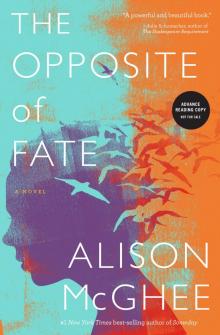 The Opposite of Fate (ARC)
The Opposite of Fate (ARC)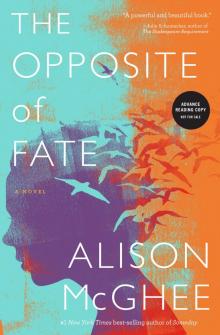 The Opposite of Fate
The Opposite of Fate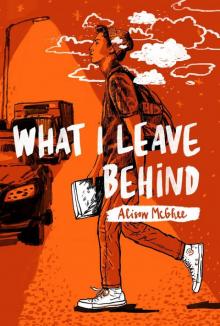 What I Leave Behind
What I Leave Behind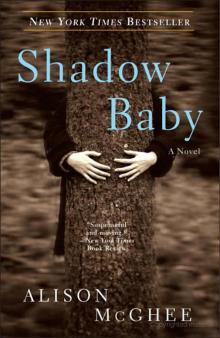 Shadow Baby
Shadow Baby All Rivers Flow to the Sea
All Rivers Flow to the Sea Was It Beautiful?
Was It Beautiful?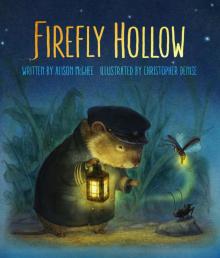 Firefly Hollow
Firefly Hollow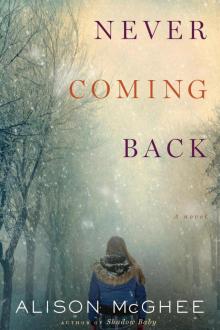 Never Coming Back
Never Coming Back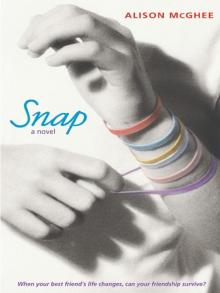 Snap
Snap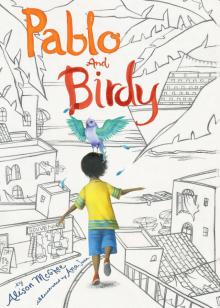 Pablo and Birdy
Pablo and Birdy